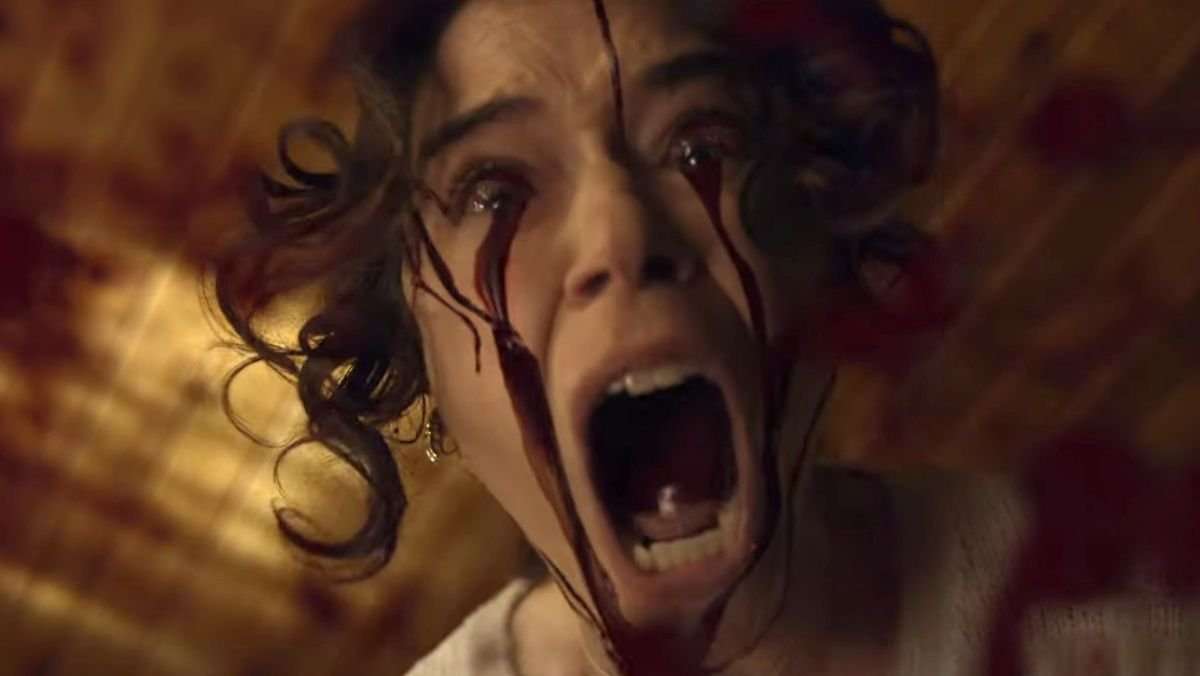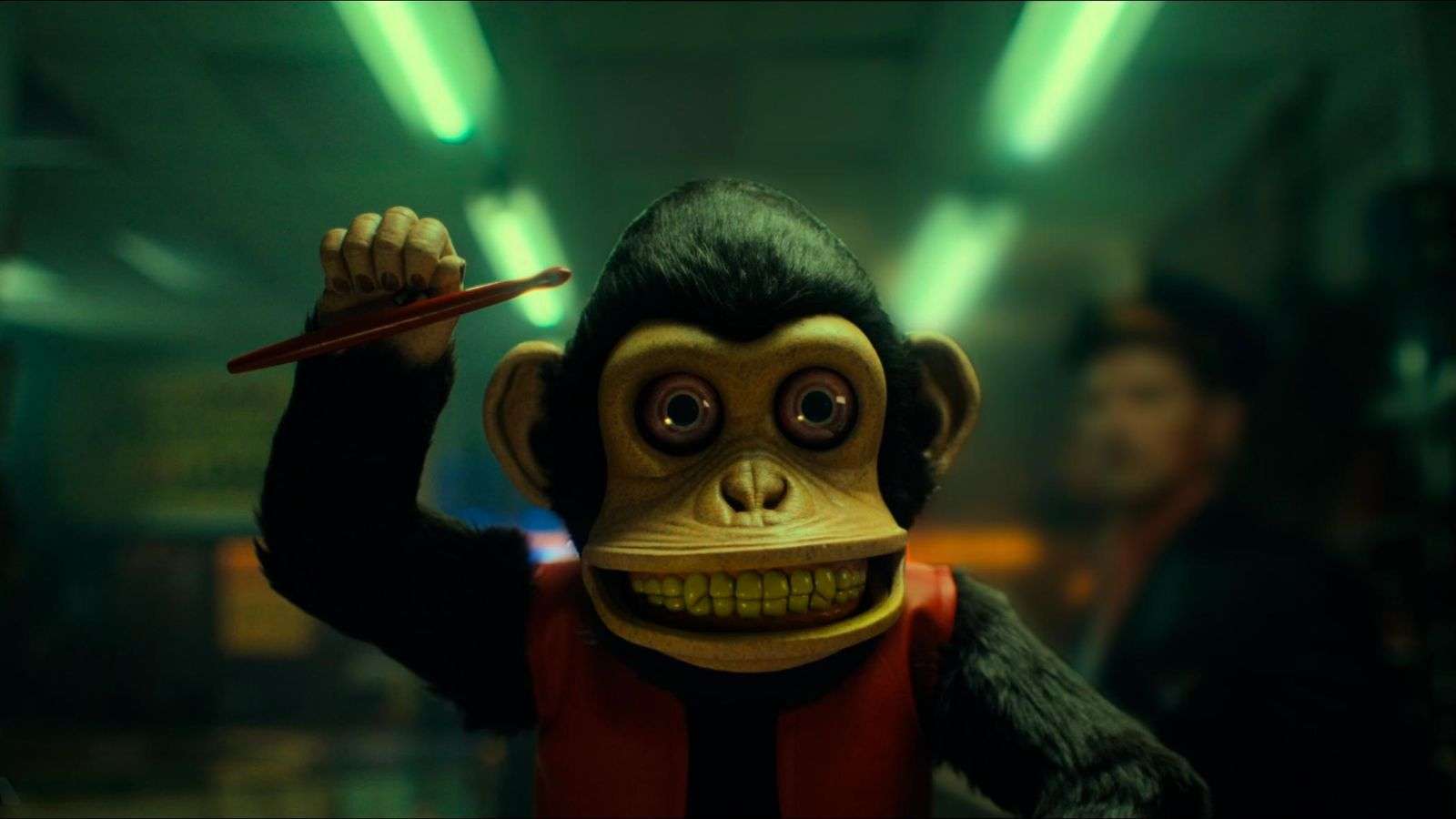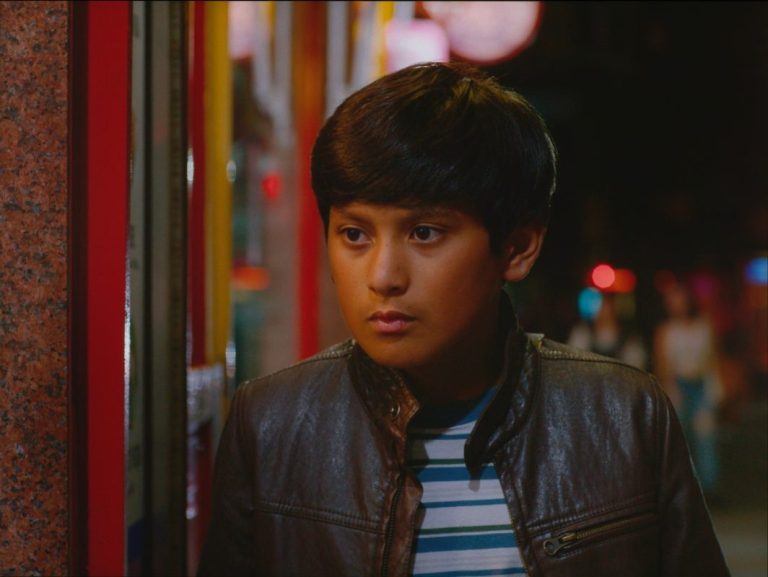Whether or not you believe that Osgood Perkins’s previous film “Longlegs” was actually a dry comedy disguised as a horror film, one distinct possibility has been made more and more plausible with the benefit of hindsight: Perkins himself may very well believe that to be the case, and the next time around, he wouldn’t make the mistake of leaving it up for debate. Fast-forward just over half a year, and Perkins is back to double down on the goofs by trading in a swollen Nicolas Cage for the next-best thing: a drum-beating monkey.
Now if the tonal obliqueness of that previous film was the result of a self-satisfied director locked with his toys in his own head, perhaps a helping hand from one of the genre’s enduring pioneers is what Perkins needs to open up the sandbox for the rest of us to play; in comes “The Monkey,” an adaptation of a 1980 short story from none other than Stephen King. And while King’s structure certainly lends the filmmaker some narrative direction (despite the major adaptational liberties taken), don’t be mistaken; this is unquestionably the Oz Perkins show, for better or worse…
The status of King’s framework as a short rather than full-length story certainly becomes clearer the longer “The Monkey” goes on, as the first 30 minutes are spent in the company of two pubescent twin brothers in 1999 (Christian Convery plays both). Bill is the older, immediately unbearable brother who takes great pride in bullying Hal over the fact that the former was born a few minutes earlier and “ate most of their mom’s placenta” (bros will be bros, amirite?). This makes the fraternal relationship contentious enough before their pilot father (Adam Scott) disappears from the family altogether, leaving nothing behind but a few knick-knacks from his worldly travels.

One of them is our titular monkey, which the brothers eventually discover has the power to call upon the gruesome death of any unsuspecting person once the key in its back is wound and the sticks in its hands beat down on its drum. After a few deaths veering between traumatic and comedic (including the boys’ mother), the estrangement between these two grows to a decade-long silence. Now, 25 years later, Hal’s (a cardboard Theo James) own familial troubles are exacerbated when his brother, and the disposed-of monkey, make a mysterious reappearance.
That the first 30 or so minutes of “The Monkey” (from its total 98-minute runtime) are spent in this prologue with the younger Hal and Bill gives an increasing sense that King’s short story was probably meant to stay that way, particularly when Perkins makes the effort in that opening act to flesh out the familial dynamic intended to come to a head in the finale. Plenty of time is spent establishing Hal’s (un)popularity and the abuse he takes at the hands of his twin, as well as the casually strained relationship the boys have with their mother (Tatiana Maslany).
Also Read: The 10 Best Horror Movies to Watch on Peacock
Ample time is spent showing Hal under the thumb of his brother’s sharp tongue (such witty teenage classics as “fuck-head” make noted appearances) and the subsequent aggressive school bullying he faces—largely, again, played for laughs by way of Greg Ng’s and Graham Fortin’s hard editing. But as Perkins leads it all to a head, and James faces off with James, we are once more left blinded by the sparks of clashing ideas, as the “Longlegs” director again blends awkward comedy with his greater conceptions of familial baggage and accepting death into a concoction that only pleases until it irritates.

Irritation can, of course, be a tool, but “The Monkey” traffics in irritation by way of the very tool intended to make it more palatable: its sense of humor. Kudos to Perkins for at least leaning into the comedy this time around, to the extent that his dry, self-satisfied personality actually shines through King’s blueprint to curate a vision that feels all his own and, in short bursts, decently entertaining. In larger doses, however, the film’s comedy begins to grate with torturous frequency, as the mixture of clumsy dialogue and mid-2010s, “wink-wink-nudge-nudge” jokes begin to clarify the larger issue with Perkins’s style: it’s not that he doesn’t know when to be funny so much as it is that, most often, he doesn’t know how to be funny.
If nothing else, one would hope that the film’s premise of “accidental” deaths would lend it some prime opportunities for elaborate, mousetrap-style carnage. Sure enough, in its best moments, “The Monkey” recalls the hilariously overworked downfalls of the “Final Destination” series, as Perkins luxuriates in the buildup just as much as the resulting gore. Other times, though, the director seems satisfied with montaging to the destination—a lawnmower mishap or a surprise in a golf hole registering for about two seconds apiece—or simply calling it a day with an exploding carcass. Sure, someone suddenly bursting into guts and blood in front of our unsuspecting protagonist is fun and all, but what about someone suddenly bursting into guts and blood in front of our unsuspecting protagonist again?
Much like the titular monkey itself—with its cavernous eyes and the unsettling mechanical crunch when its lips part to reveal those jagged teeth—the appeal of the film surrounding it seems largely based on the silliness of finding something so innocuous to be this creepy. Such is Stephen King’s M.O. to find bloodcurdling terror in something as ordinary as a toy (or a saint Bernard… or the mist), and such is Osgood Perkins’s apparent M.O. of making us feel foolish for ever having been scared of such things in the first place. If everybody dies, it makes sense that everybody should laugh; the question is, how long before the joke becomes stale?



![Wildland [2020]: ‘Fantasia’ Review – Danish ‘Animal Kingdom’ is about the vicious circle of violence](https://79468c92.delivery.rocketcdn.me/wp-content/uploads/2020/08/Wildland-Movie-Review-highonfilms-3-768x442.jpg)
![The Last Letter from Your Lover [2021]: ‘Netflix’ Review – Beautifully Shot, Yet Leaves Little to Desire](https://79468c92.delivery.rocketcdn.me/wp-content/uploads/2021/07/The-Last-Letter-From-Your-Lover-768x453.jpg)
![The Tribe [2015] : Love & hatred don’t need translation](https://79468c92.delivery.rocketcdn.me/wp-content/uploads/2016/01/the-tribe-mondo-film-poster-images.jpg)

